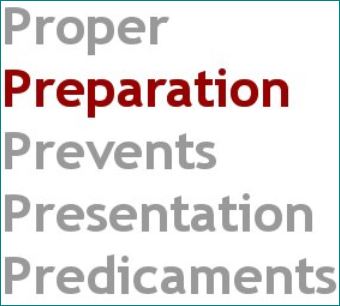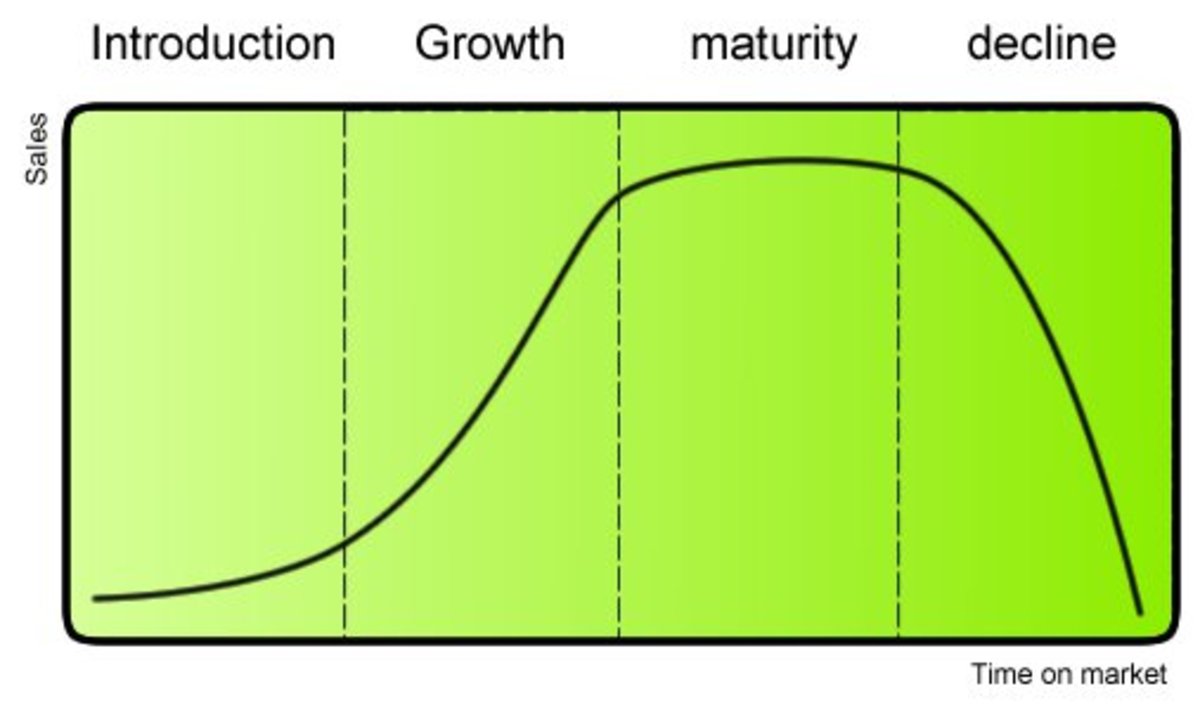Sales Call Preparation

Find the Time to Prepare or Lose the Sale
If you have been involved in sales longer than a day or two, you have found yourself unprepared to some extent for the close. Sure, you felt like you were able to distract the buyer from your ineptness. Sure you can convince yourself that you just "BSed" yourself professionally past the questions that were brought up and now you can come back and win this account next time. Sure you don't want to appear too aggressive, too overpowering, too smart which might make you appear arrogant or flippant to the buyer, right?
Face It, You Screwed Up!
I have been on a very few sales calls where the buyer was way out in front of me, and loved it. I have rarely been in a situation where the person I was going to sell something to just rubber stamped whatever I said and there really was no selling involved. Most selling, following again the 80/20 rule, involves some kind of preparation and understanding of the potential customer's needs and your ability to provide solutions to fit those needs.
One thing that is consistent throughout all industries and services, prepared salesmen win more sales than unprepared salesmen do. Doing your homework prior to the very first sales call is critical to success long term. So where does it begin?
Know Your Products and Services
Nothing can turn off a potential buyer faster than you not knowing the capabilities of your products. He/she may give you a pass on some of your knowledge of some of your competitors products, but not knowing your own is a critical mistake - at least to the extent of what is on the label kind of use. I have used instruments intended to be used to measure a minimum of O2 in the atmosphere to measure a maximum instead. That was because if there was O2 above 2% in the proposed atmosphere it could provide the ability to explode. When the customer asked about having that product, at first I hadn't thought of using our product in that application - a competitor had. I had to think on my feet but knew my product well enough to make the necessary changes. The sale was made and it is in use today. Had I not known my own products well enough, I would have missed thousands of dollars of sales at that moment.
Medical products have labels that indicate exactly what the product has been tested for using it - pharmaceuticals as well as medical devices. Then all the sudden a doctor, generally considered pretty smart folks by most people, considers the use of the product for something other than what is on that label. This is called "off-label use" and is very common in medicine. The doctor takes the responsibility for using the product off label because he personally sees, with his/her training what he believes as a possible better use for the product even though it may not have been tested for that use. Doing that with industrial products isn't a good idea. Doctors have a big advantage in this type of use. They can usually argue the medical facts as they know them and stand on their training to make that decision. That is very hard to do for industrial salespeople telling someone how just because it isn't on the label you "think" it could be used for some application. Oh, that doctor, he pays big bucks for medical malpractice too, are you paying for something similar?
I was on a recent sales call with a junior salesperson. Ahead of the call I had arranged with a potentially very large client, I contacted the junior salesman and asked if he was bringing his A-game to the meeting. Oh, of course. His expectations were just to feel out the prospect to see where there may be some areas we could be of assistance or offer new products, not that he would be doing so at that time. I called him again, just days prior to the meeting to be sure his strategy was in place, that he had done his homework on the customer, similar customers, understanding what their needs may be and specifics about what we would be able to offer.
In this case the salesman had a very strong history in the general field, and the vertical he had been selling into was one specific industry in particular. The sales call we were making was a much different industry requiring often very specific tools and with a different social environment than the industry he was used to. I knew this and had prepped my junior guy ahead of time, I thought, or at least had made these suggestions.
The very high level contact that had offered us a moment of their time, (very, very unusual for someone of this level in this particular company). She brought us into her office and offered us business cards. She then asked my guy to explain what areas of support his company could provide as she would help move the discussion forward by filtering out quickly those areas that she was already satisfied in but in the event there was something she was weak on she would entertain that. My guy stumbled.
After a weak response, he offered a brief overview of our company and some general areas of expertise. He mentioned the number of our engineers, to which she immediately asked how many of them were local. To me a certain clue - local to her meant rapid service, but it was lost on him I think. He went on to discuss growth of our company since it came around 7 years ago, to which she asked how many companies in her industry we were doing business with. His answer, to his knowledge, one and he offered the name. She asked just what are you doing for that company - and his answer - I don't know, it isn't my account. Really? Seriously? He knew we had an account similar to the one we were calling on and didn't investigate ahead of time to see what we were doing for them?
She saw this wasn't going anywhere fast so being kind she started to take over the discussion. She outlined half a dozen areas he had brushed over in the introduction giving him a moment to think. She said, in particular, "these areas are already being taken care of by companies that I have personally selected over the past year so they are off the table. What other areas are you engaged?" What an opening - what a chance to shine! My guy's response was to gander around the room and saw a component on her desk that he knew we had some background in. It led to a short discussion that may give us a reason to keep in touch, but honestly was a dodge because "Fail" was being printed on our foreheads at that time.
We wrapped up our conversation when my guy surmised that we probably don't have anything to offer her of great value so we wouldn't waste any more of her time. Astonished, I stood and the three of us walked out. She tapped me on the shoulder and asked me back to her office. "I really never do this but feel compelled somehow for you. Please offer your salesman the following constructive criticisms. Attitude - his was arrogant, his posture was slouchy, and his professionalism short of none. For him not to know what you are doing with the company he mentioned so we may have some similarity is unforgivable. I am offering this as a friend - and I believe I saw in your eyes some of what I am talking about!" I apologized to which she said, no apology on your part is needed. I appreciate your support.
When I got to the car with my junior guy, he asked what she had said. I asked him what he thought she had said, to which he replied,"probably that our systems sound too expensive for what they have the budget for (arrogance), that they probably couldn't afford our services (arrogance), and that maybe we can do something on a minimum bid schedule (arrogance). She is exactly the bi### I had heard she was!"
Of course he was embarrassed. He talked a mile a minute to me for the next 20 minutes about how dumb she must be and how rude she was, and arrogant. Finally, after a while, I was able to ask him if he ever did do any preparation. "No, not more than I already knew. I'll check with my buddy to see what we are doing with that other company and see if it fits for something with her. I'll get her out a paragraph but I don't see much opportunity there."
Now, keep in mind this is a company that is the largest employer in 12 counties. This is a company that is about a billion dollars a year in revenue. They are about to expand to a second location where the basic construction is over $200 million. Our opportunity is far in excess of $20 million with these people annually.
Know Your Customer
With Facebook, LinkedIn, and all the other social media content out there, I cannot fathom a reason why you don't know who you are going to talk to and a bit about their backgrounds. Why wouldn't you spend some part of your day prior to a meeting to understand this!
I know a buyer at a particular company that hates bass fishing. The guy that had the job prior to him had a big bass hanging on the wall in the office and didn't take it with him when he left. Now when salesmen come calling - if they mention this buyer's interest in bass fishing, he kicks them out realizing they have little to talk about and know even less about him.
Begin closing when you walk in the door. Look for the opportunity to close on something in every meeting. Closing a sale can mean closing the agreement to meet again - although that may not pay much commission right away, but go with it if that is all you can get.
Know yourself so you can know your customer!
The Inventurist









